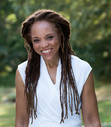Sophfronia Scott's Blog: Sophfronia Scott, Author, page 28
May 3, 2016
Book Review: Eleven Hours by Pamela Erens
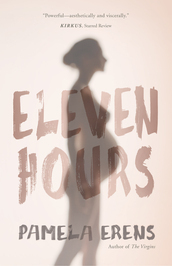 Destiny would have it that when two people meet, especially when they are of disparate personalities and cultures as Lore and Franckline, the main characters created by Pamela Erens for her third novel, Eleven Hours, they have something to learn from each other. Perhaps there’s a need, a bit of karma they have to work out between themselves. Lore, a young white teacher, arrives alone at the maternity ward of a New York City hospital with a birth plan so dense it may as well be a legal brief. Franckline, a Haitian immigrant in the early stages of her own unannounced pregnancy, is the nurse overseeing Lore’s labor. She recognizes right away the thorny patient may have something to teach her.
Destiny would have it that when two people meet, especially when they are of disparate personalities and cultures as Lore and Franckline, the main characters created by Pamela Erens for her third novel, Eleven Hours, they have something to learn from each other. Perhaps there’s a need, a bit of karma they have to work out between themselves. Lore, a young white teacher, arrives alone at the maternity ward of a New York City hospital with a birth plan so dense it may as well be a legal brief. Franckline, a Haitian immigrant in the early stages of her own unannounced pregnancy, is the nurse overseeing Lore’s labor. She recognizes right away the thorny patient may have something to teach her.
“This girl in room 7, so solitary, so wary, seems a sort of warning. Franckline should not become like that, a person too shut up in herself, too frightened and proud to share her pain. There is a side of her, she knows, that gravitates in that direction, toward that pride, that aloneness.”
Lore’s pride is actually more the response of an injured person. Betrayed by the father of her baby, she seems to chide herself for all the signs she missed. Her birth plan could even be a “not again” notion on her part—she attempts to wrangle control once more by foreseeing, she thinks, every possibility and accounting for every detail of the birth. But Franckline seems to be there to let Lore know life will happen anyway, despite such careful planning.
A bond develops between the two women and its formation is the core story of Eleven Hours. It’s a swift read, just 175 pages, but nothing about the book feels rushed, including the well-observed progression of Lore’s labor. In all the right moments Erens astutely relates how the insistent pain of childbirth can make minutes feel like hours and a short walk down a hallway seem like an expedition across the Sahara. She takes risks to maintain a sense of immediacy: point of view shifts going back and forth between Lore and Franckline happen without warning and can be disconcerting in the early pages. So often workshop instructors warn writers against muddying the point of view waters. But having read the author’s first two books, The Understory (2007) and The Virgins (2013), I know she can tell a great story in unconventional ways. In other words, good writers can bend the rules. And Erens is an excellent writer.
Eventually I came to see what Erens was doing as all of a piece—the two women as one voice communicating all the various experiences of womanhood: love, loss, fear, jealousy, hope, anxiety, just to name a few. Lore and Franckline are not as different as it seems and neither are we as readers. This provides another level of immediacy, opening the doorway to our own connection with the book as we see ourselves within and making the eleven hours experienced in the novel time well spent.
March 10, 2016
The Mentor I’ve Never Met
Here’s my latest on Ruminate Magazine’s site:

The writer Frederick Buechner
I’ve never met Frederick Buechner—let’s start there. In case you don’t know him, here’s the quick rundown from his website: Frederick Buechner (pronounced BEEK-ner) is an American writer and theologian, the author of more than thirty published books. He has been a finalist for the Pulitzer Prize and the National Book Award, and has been awarded eight honorary degrees from such institutions as Yale University and the Virginia Theological Seminary.
He’s also my writing mentor.
How is that possible? The author Dani Shapiro explains it well in her blog on having mentors you’ll never meet: “But in recent years I’ve been accompanied on the journey by a few writers and artists I have never personally known. I keep their books close to me. I carefully write passages from their work into my commonplace books, committing their thoughts to memory, and when I do this, I feel almost as if our souls might be touching through time.”
Frederick Buechner, when I reach out to him through time and space, is such a mentor to me.
To read the rest of this essay please visit Ruminate by going here.
I hope you enjoy it.
 By the way, you should also know–and I’m really psyched to share this–I’m teaching at the Frederick Buechner Writer’s Workshop at Princeton Theological Seminary, June 7-10, 2016. It’s going to be an exciting event and I’m looking forward to visiting the area–I bet Princeton is gorgeous in June! See you there.
By the way, you should also know–and I’m really psyched to share this–I’m teaching at the Frederick Buechner Writer’s Workshop at Princeton Theological Seminary, June 7-10, 2016. It’s going to be an exciting event and I’m looking forward to visiting the area–I bet Princeton is gorgeous in June! See you there.
Blessings,

January 15, 2016
The Gifts of My MFA
For many years I held close to my heart the desire to go back to school to get my MFA in creative writing. I had this feeling that I was in a place where such intensive study would help my art immensely. But whenever I shared this thought I would get some combination of these two responses:
“You don’t need an MFA, you’ve already published a novel.”
“Why? Do you want to teach? Teaching is not all it’s cracked up to be. You won’t be able to write. You won’t be able to find a job, the market’s saturated.”
For some time I listened to these responses and kept the idea of an MFA to myself. Here’s the thing about that first comment: yes, I’d written and published a novel. But I always felt as though it were an airplane contraption I’d built on my own in my garage. Yes, I managed to get it off the ground and it flew and flew well. However I had the sense that I could build a jet, maybe even a rocket. And I needed help to do that.
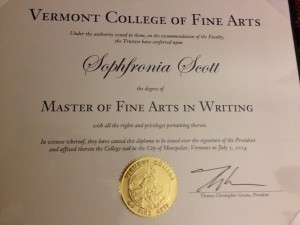
My diploma
I finally decided to go for my MFA in 2011. You can read about the journey that took me to that decision in my essay “A Change in Direction” in Chicken Soup for the Soul: Inspiration for Writers. I started the program at the Vermont College of Fine Arts (VCFA), graduated in 2014, and it was the best thing I ever did for my writing life.
This is the season for applying to MFA programs and I know many writers are now struggling with the same questions and considerations I had. I’ll share here the gifts of my MFA in the hope that it will help others in their decision-making process. Here’s what I received from my MFA:
A community of writers: This perk is mentioned so often it’s almost cliché but let me add to it. It’s not about just having a big group of people in the same room who know your name and you all have in common this thing about putting words down on paper. It’s about the people you find within the group—the people who turn out to be your people. Though we only saw each other every six months (VCFA is a low-residency MFA program) I developed strong bonds with a core group of friends who came to know me and my work well enough to inspire and challenge me in ways I didn’t expect. I grew as a person and as a writer because of their influence and this still goes on today.
A way of writing: I knew I could write but I didn’t know why. I felt I could have a better technical grasp of my craft. It was like I was waving around a sword (or a light saber for you Star Wars fans) but I really didn’t know what I was doing with it. Now in my writing I can hold the sword with more confidence and wield it with intention and more precision. And, I should add, I’m writing more and more consistently. I’ve finished one manuscript and I’m close to completing another as of this writing.
New genres in which to play: I entered VCFA as a fiction student. For me the genre of nonfiction was the journalism background I had come from and I didn’t see myself writing much of it in the future. But I learned that creative nonfiction covers a wide array of writing from essays to memoir to literary journalism. A friend convinced me I was already writing it in essays I’d published in places like More Magazine. So I became a dual-genre student and received my degree in both fiction and creative nonfiction. I read and explored poetry as well.
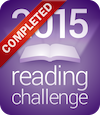 A way of reading: I’m slow reader and before the MFA I’d be lucky if I got through a half-dozen books in a year. But reading is a major tool for a writer and I knew I would have to read more if I was going to improve my work. I don’t read any faster, I think, but my time at VCFA taught me if I’m diligent and consistent I can read a lot more than I did before. Now I read about 40 books a year even now that I’m 18 months past my graduation. If anything I would love to read even more because it’s hard to balance the new books coming out with classics I haven’t read yet plus books I read to help with what I’m writing at the moment. So much to read! But at least I am reading and I love it.
A way of reading: I’m slow reader and before the MFA I’d be lucky if I got through a half-dozen books in a year. But reading is a major tool for a writer and I knew I would have to read more if I was going to improve my work. I don’t read any faster, I think, but my time at VCFA taught me if I’m diligent and consistent I can read a lot more than I did before. Now I read about 40 books a year even now that I’m 18 months past my graduation. If anything I would love to read even more because it’s hard to balance the new books coming out with classics I haven’t read yet plus books I read to help with what I’m writing at the moment. So much to read! But at least I am reading and I love it.
The writing world opened: The great thing about an MFA is all of what you receive doesn’t stop after graduation. The writing world is open to you and you can participate in it as much as you like. I attended my first conference of the Association of Writers and Writing Programs (AWP) while at VCFA. It’s a huge gathering of about 10,000 writers and at these events I have the pleasure of meeting in person writing friends I’d met via social media and seeing again writers who had visited VCFA—generous, encouraging teachers such as Richard Bausch and Brian Leung who remain wonderful, encouraging friends. I’m attending AWP in Los Angeles this March speaking on a panel and participating in an offsite reading.
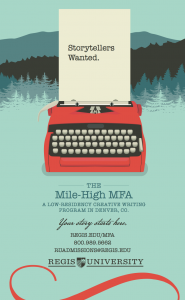 New opportunities: The teaching landscape is difficult to navigate but I’ve found the opportunities best suited to me do come my way. I’m thrilled to be on the faculty of Regis University’s Mile-High MFA program in Denver, Colorado. I’m also teaching courses at the Fairfield County Writer’s Studio and this summer I’ll present two sessions at the Frederick Buechner Writer’s Workshop at the Princeton Theological Seminary. I wouldn’t have made the connections that made these opportunities possible if I hadn’t gone for my MFA.
New opportunities: The teaching landscape is difficult to navigate but I’ve found the opportunities best suited to me do come my way. I’m thrilled to be on the faculty of Regis University’s Mile-High MFA program in Denver, Colorado. I’m also teaching courses at the Fairfield County Writer’s Studio and this summer I’ll present two sessions at the Frederick Buechner Writer’s Workshop at the Princeton Theological Seminary. I wouldn’t have made the connections that made these opportunities possible if I hadn’t gone for my MFA.
So these are my gifts and I’m grateful, tremendously grateful for every single one. If you’re considering the MFA journey know this: your own gifts are waiting for you. It’s up to you to decide to receive them.
November 11, 2015
Writers to Read: Robert Vivian
I’m going to tell you to read a book that’s not here yet. But it’s coming. In fact it’s quite close. At first I only sensed it out there somewhere, its wake pushing waves across an ocean and causing seawater to lap at my toes where I once stood on dry land. Now I see this book, a gorgeous ship at full sail, on the horizon. It’s so beautiful I feel impelled to cry out, “Look, it’s here!”
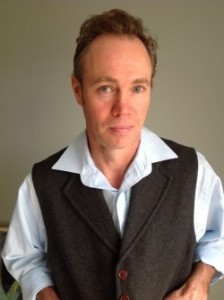 The vessel we await is called Mystery My Country, and it contains a collection of dervish essays written by Robert Vivian, the author of four novels and two collections of meditative essays. It arrives in 2016, published by Anchor & Plume. A dervish essay is a prose poem that takes on the spinning energy of its namesake. But it goes beyond the realm of poem and stakes itself in nonfiction because Vivian molds the form to make it so. Using precious little punctuation he feels his way through, much as a straight essayist would, a notion, an observation, a question, all in service to better understand and appreciate what connects life to himself and his world.
The vessel we await is called Mystery My Country, and it contains a collection of dervish essays written by Robert Vivian, the author of four novels and two collections of meditative essays. It arrives in 2016, published by Anchor & Plume. A dervish essay is a prose poem that takes on the spinning energy of its namesake. But it goes beyond the realm of poem and stakes itself in nonfiction because Vivian molds the form to make it so. Using precious little punctuation he feels his way through, much as a straight essayist would, a notion, an observation, a question, all in service to better understand and appreciate what connects life to himself and his world.
To read the rest of this review, written for Assay: A Journal of Nonfiction Studies, use this link.
When asked to contribute to the Assay series on “Writers to Read” I seized the opportunity to discuss an intriguing form, the dervish essay, and Vivian’s forthcoming book.
Enjoy!
October 22, 2015
Why Ruminate Matters
My issue of Ruminate arrived in the mail today. I’m happy to see the swooping cursive capital R on the cover. Just inside the front is a painting of a stoic heron gliding over blue water toward a full moon. The presence of a new Ruminate is a signal: it’s time. It’s time to slow down and pay attention, as the note on the opposite page from the heron reminds me. It’s time to chew on questions of life, faith, and art. It’s time to participate in an important and growing conversation about the wonders of our world.
The first Ruminate I ever read was a PDF file I purchased in February 2013 so I could check out the publication. I wanted to find the right place for my more faith-based or spiritual pieces. And I do mean the right place.
I’m not a writer who, like throwing darts, submits work to hundreds of literary journals. I understand this limits my chance of publishing more frequently, but when a piece of mine is accepted, I want to have an understanding of what it means for me to be in that journal.
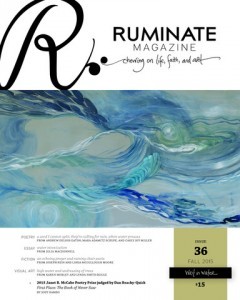 Do I admire it?
Do I admire it?
What does it feel like in my hands?
Does it publish writing I want to emulate?
Will my work jibe with its sensibilities?
It’s like developing a relationship—in order to gain this understanding, I have to see the journal on a regular basis. Which means I have to be a subscriber. Literary publications are expensive, but if I believe in a journal, I want to support it. And being a subscriber consistently keeps my goal of being published in the journal in front of me. I get positive reinforcement every time it shows up in my mailbox.
The breathtaking art and powerful writing I consumed in that first PDF inspired me to subscribe toRuminate. The moment I held it in my hands I knew I wanted to be in the book. The paper was and is substantial, thick, and satisfying. Eventually I had the honor of being named a finalist inRuminate’s VanderMey Nonfiction Prize and having my essay published (“Why I Must Dance Like Tony Manero,” Issue 33).
What I didn’t expect, though, was how much my Ruminate subscription would engage me not only as a writer but also as a reader.
I wanted the conversation within its pages to find its way into my life. I bought subscriptions and copies for my friends. Last summer I took a stack of Ruminate issues to a friend’s house so we could have tea and talk about why I felt she should submit her art to Ruminate’s Kalos Foundation Visual Art Prize. There’s something exhilarating about the way Ruminate captures the feeling that we are all part of a bigger process. To have more people partake of this feeling, I believe, can only be more of a very good thing.
A journal like Ruminate is rare. Most literary publications of such high quality are subsidized by university presses, but Ruminate has no such cushion.
Ruminate is published independently, a ten-year labor of love produced by a volunteer staff. But it is time for Ruminate to reach a wider audience and to grow to a level where it has a louder voice in the literary world. If it doesn’t grow it will soon go silent. I know the pain of watching a publication disappear both on a large scale (Teen People where I was once an editor) and a small one (The Newtowner, a local journal in my town that lasted only two to three years). In such a landscape the fact that Ruminate has published so well for 10 years is impressive. And all the more reason to help it continue.
Right now Ruminate is in the process of raising enough support to finance this expansion and ensure its ongoing existence. I don’t often participate in fundraising campaigns. I write about this one because I believe the existence of this journal is important for writers and readers alike. There aren’t many journals that offer this kind of special place where we can contemplate the art that awakens us to beauty and the faith that sustains us. Please consider subscribing and donating so this place remains.
September 17, 2015
My Thoughts on Rob Bell
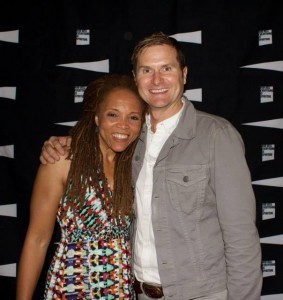 My latest contribution to Ruminate Magazine’s website shares a bit of the long and winding road that is my ongoing spiritual journey. The latest stop on this trip included a visit to New York City to hear Rob Bell speak in the latest rendition of his “Everything is Spiritual” tour. As I explain in my essay, he’s a controversial figure in the religious world. But, “My spiritual journey is not about following gurus or cults of personality. It is about connection—finding friends, kindred spirits, brothers and sisters. Once encountered, we tend to recognize each other.” While I can’t speak for Rob, I get the sense that we hold our faith in a similar way and evangelize accordingly. The controversy comes in because others, surprisingly of the same faith, seem to think he isn’t going about things in the right way. They kind of remind me of a tyrannical child in a sandbox who won’t let you play or build anything unless you do it by his earthbound rules. Of course the other kids eventually give up and leave, defeating the purpose of the sandbox–to be in community, our hands deep in the messy but awesome business of discerning God’s will, and taking our part in the ongoing creation that is His plan and not someone else’s. I admire Rob’s determination to stay in the sandbox. My essay will show you why I do the same. Here’s the link to the piece. I hope you enjoy it. In the meantime, please pass the sand bucket. And maybe the starfish mold…
My latest contribution to Ruminate Magazine’s website shares a bit of the long and winding road that is my ongoing spiritual journey. The latest stop on this trip included a visit to New York City to hear Rob Bell speak in the latest rendition of his “Everything is Spiritual” tour. As I explain in my essay, he’s a controversial figure in the religious world. But, “My spiritual journey is not about following gurus or cults of personality. It is about connection—finding friends, kindred spirits, brothers and sisters. Once encountered, we tend to recognize each other.” While I can’t speak for Rob, I get the sense that we hold our faith in a similar way and evangelize accordingly. The controversy comes in because others, surprisingly of the same faith, seem to think he isn’t going about things in the right way. They kind of remind me of a tyrannical child in a sandbox who won’t let you play or build anything unless you do it by his earthbound rules. Of course the other kids eventually give up and leave, defeating the purpose of the sandbox–to be in community, our hands deep in the messy but awesome business of discerning God’s will, and taking our part in the ongoing creation that is His plan and not someone else’s. I admire Rob’s determination to stay in the sandbox. My essay will show you why I do the same. Here’s the link to the piece. I hope you enjoy it. In the meantime, please pass the sand bucket. And maybe the starfish mold…
August 27, 2015
What Back to School Means to This Writer
Summers tend to reshape my writing life. My husband is a teacher so when school ends in June both he and our 11-year-old son, Tain, are home and my carefully honed routine dissolves within days. That didn’t mean I stopped writing altogether this summer. I just had to accept writing under different conditions. At any given time, for example, Tain, all 85 pounds of him, would come into my office and sit on my lap. Or my husband would come in to inquire what I’m doing or to sit on my chaise and read.
I suppose I could have put a Do Not Disturb sign on my door or communicated a hard and fast “Don’t bother Mama while she’s writing” rule, but I didn’t. These warm and lovely days are fleeting. For all I know this may be the last summer Tain will be able to fit on my lap. And the time my husband spends in my office is brief because, being a musician, he has his own artistic pursuits. I was grateful for impromptu hikes, going out for ice cream, and being available to drive Tain to and from his rehearsals for the show he was in this summer, “The Lion King, JR.” I told Tain as we waited for his school bus I would miss all these things and it’s true.
But I have missed my routine. I am happy to have once again time to think, and time to take better care of myself. After putting Tain on the school bus I exercise, shower and dress, then write. It sounds simple but it’s grounding. And that’s what I need. In her wonderful book Still Writing, the author Dani Shapiro quotes a list of instructions for writers left by the poet Jane Kenyon:
Protect your time. Feed your inner life. Avoid too much noise. Read good books, have good sentences in your ears. Be by yourself as often as you can. Walk. Take the phone off the hook. Work regular hours.
I have these words on a bulletin board next to me in my office. When I posted them I made peace with the fact that there will be many days, as there were this summer, when following these instructions would be impossible. They do remind me, though, to honor the days when it is possible. Today is such a day. It’s a good day.
July 4, 2015
The Importance of Forgiveness
 Last week I was working on an essay I planned to submit as my latest contribution to Ruminate Magazine‘s blog. Then I read Roxane Gay’s “Why I Can’t Forgive Dylann Roof” in the New York Times. It bothered me so much I woke up thinking about it the next morning and knew I wanted to respond. I emailed my Ruminate editor and told her I would be scrapping what I was writing and sending her something entirely different. I ended up writing, “For Roxane Gay: Notes from a Forgiving Heart,” and you can read it at this link. I’m not saying she has to forgive him but I do believe it’s important to discuss why this level of forgiveness matters. In fact I felt it was so vital that this is the first completed essay I’ve managed to write in connection with the Sandy Hook shooting at my son’s school, two and a half years later. I hope you’ll comment on the piece and join this ongoing discussion.
Last week I was working on an essay I planned to submit as my latest contribution to Ruminate Magazine‘s blog. Then I read Roxane Gay’s “Why I Can’t Forgive Dylann Roof” in the New York Times. It bothered me so much I woke up thinking about it the next morning and knew I wanted to respond. I emailed my Ruminate editor and told her I would be scrapping what I was writing and sending her something entirely different. I ended up writing, “For Roxane Gay: Notes from a Forgiving Heart,” and you can read it at this link. I’m not saying she has to forgive him but I do believe it’s important to discuss why this level of forgiveness matters. In fact I felt it was so vital that this is the first completed essay I’ve managed to write in connection with the Sandy Hook shooting at my son’s school, two and a half years later. I hope you’ll comment on the piece and join this ongoing discussion.
Thanks and be well,
June 18, 2015
On the Gospel and the #CharlestonShooting
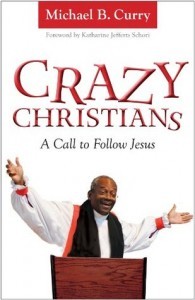 I’ve been reading Michael B. Curry’s Crazy Christians: A Call to Follow Jesus. Today I read this, which of course led me to think of the members of Charleston’s Emanuel African Methodist Episcopal Church who were indeed following the Gospel witness of welcome when they welcomed a stranger into their Bible study circle. I’m angry about the results, but in my heart I know we must continue to follow their example of welcome. Here’s why according to Bishop Curry:
I’ve been reading Michael B. Curry’s Crazy Christians: A Call to Follow Jesus. Today I read this, which of course led me to think of the members of Charleston’s Emanuel African Methodist Episcopal Church who were indeed following the Gospel witness of welcome when they welcomed a stranger into their Bible study circle. I’m angry about the results, but in my heart I know we must continue to follow their example of welcome. Here’s why according to Bishop Curry:“We never know what can happen when we feel called to follow Jesus’ gospel witness of welcome. Heeding such a call can require incredible courage. Sometimes this gospel way of welcome can lead us to put our very lives on the line. But Jesus’ way of welcome can inspire us to keep working to do what is right in a world where too often too much is wrong.”
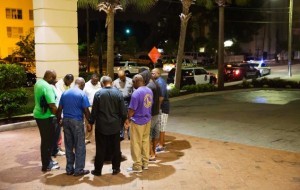
David Goldman/AP
Blessings and best wishes. Praying for Charleston.

May 26, 2015
Ruminating on Grace

Ruminate Magazine Cover
Recently the editors of Ruminate Magazine asked me to be a contributor to its blog. Ruminate is a fine literary journal produced in Fort Collins, Colorado that publishes short stories, poetry, creative nonfiction, and visual art that resonate with the complexity and truth of the Christian faith. I’ve read and admired it for some time so I was thrilled when my essay, “Why I Must Dance Like Tony Manero,” was named a finalist for Ruminate‘s VanderMey Nonfiction Prize and published in Issue No. 33.
I’m excited to write for the blog as well because as my work progresses I’m noticing I have a lot of thoughts about faith and my spiritual journey that I’m sifting through on the page. Ruminate‘s request was a timely one. It’s nice to know this writing will have a home.
Here’s the link to the first essay, “The Definition of an Open Heart,” in which I ponder the meaning of grace. I hope you enjoy it.
Cheers,



